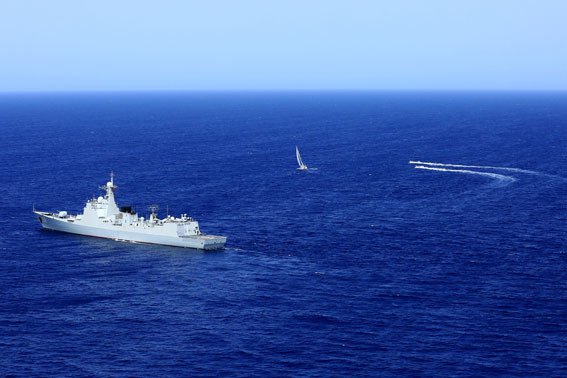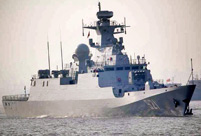


(File Photo)
India recently declined a U.S. proposal suggesting it participate in joint patrols in the South China Sea. An expert said that the country does not want to be tied to the “chariot” of the U.S. because its core interests are not in the South China Sea.
Harry B. Harris, chief of the U.S. Pacific Command, in his recent Indian visit, proposed that the navies of Japan, Australia and India join the U.S. in conducting joint naval patrols in Asia-Pacific, especially in the South China Sea in the name of freedom-of-navigation operations.
He said “India is an important fabric in the American tapestry”, adding that India is a critical part of tapestry of the United States Pacific Command.
But the idea was not echoed by India. Indian Defense Minister Manohar Parrikar said, "As of now, India has never taken part in any joint patrol, and we only do joint exercises. The question of joint patrol does not arise.”
Indian naval spokesman D.K. Sharma underscored India’s position that it only participates in military operations that take place under the U.N. flag. “The biggest example in contemporary times is the Gulf of Aden patrols,” he added.
According to Ye Hailin, a researcher at the Chinese Academy of Social Sciences, the Southeast Asia is not a core strategic zone for India. The southern Asian country is more of an opportunist in the region, who is unwilling to shoulder any risks. By participating in the joint patrol, it can earn more trust from the U.S. However, India is unlikely to play the leading role.
On the other hand, the so-called joint patrol in the South China Sea is clearly targeted against China. Joining the patrol will severely damage its ties with China, Ye pointed out.
Conflicts within China’s sovereignty are not exactly a good thing for India’s security strategy. Therefore, it is unwilling to get involved, or to be tied to the U.S. “chariot”.
What India needs is military cooperation with the U.S., Japan and Australia, including the military logistic supply agreement with the U.S., said Ye. But it does not mean that India will blindly follow the superpower, he added.
“With the help of the U.S., India hopes to strengthen its presence in the Indian Ocean, not the South China Sea. As a result, India will stay vigilant to China’s activities in its key strategic area, the Indian Ocean,” Ye concluded.
 Thai most beautiful transgender Nong Poy release new photos
Thai most beautiful transgender Nong Poy release new photos Now and then photos of Shanghai Jiaotong University
Now and then photos of Shanghai Jiaotong University Is this what air travel will look like in 2050?
Is this what air travel will look like in 2050? Aerial view of watermelon terraces in S China's Baise
Aerial view of watermelon terraces in S China's Baise Traditional wedding of a post-80s Tibetan couple
Traditional wedding of a post-80s Tibetan couple Models in cheongsams present classical oriental beauty
Models in cheongsams present classical oriental beauty Second commissioned C28A corvette made by China enters Algerian Navy
Second commissioned C28A corvette made by China enters Algerian Navy Intoxicating Wuyuan in spring
Intoxicating Wuyuan in spring Gold and silver wares of Qing Dynasty exhibited in Shenyang Imperial Palace
Gold and silver wares of Qing Dynasty exhibited in Shenyang Imperial Palace Top 20 hottest women in the world in 2014
Top 20 hottest women in the world in 2014 Top 10 hardest languages to learn
Top 10 hardest languages to learn 10 Chinese female stars with most beautiful faces
10 Chinese female stars with most beautiful faces China’s Top 10 Unique Bridges, Highways and Roads
China’s Top 10 Unique Bridges, Highways and Roads Not a child’s play: Kids working as adults to make a living
Not a child’s play: Kids working as adults to make a living Chinese town on North Korean border faces bleak business prospects
Chinese town on North Korean border faces bleak business prospects China set to boost access for US investors
China set to boost access for US investors Premier mollifies fears over economy
Premier mollifies fears over economyDay|Week